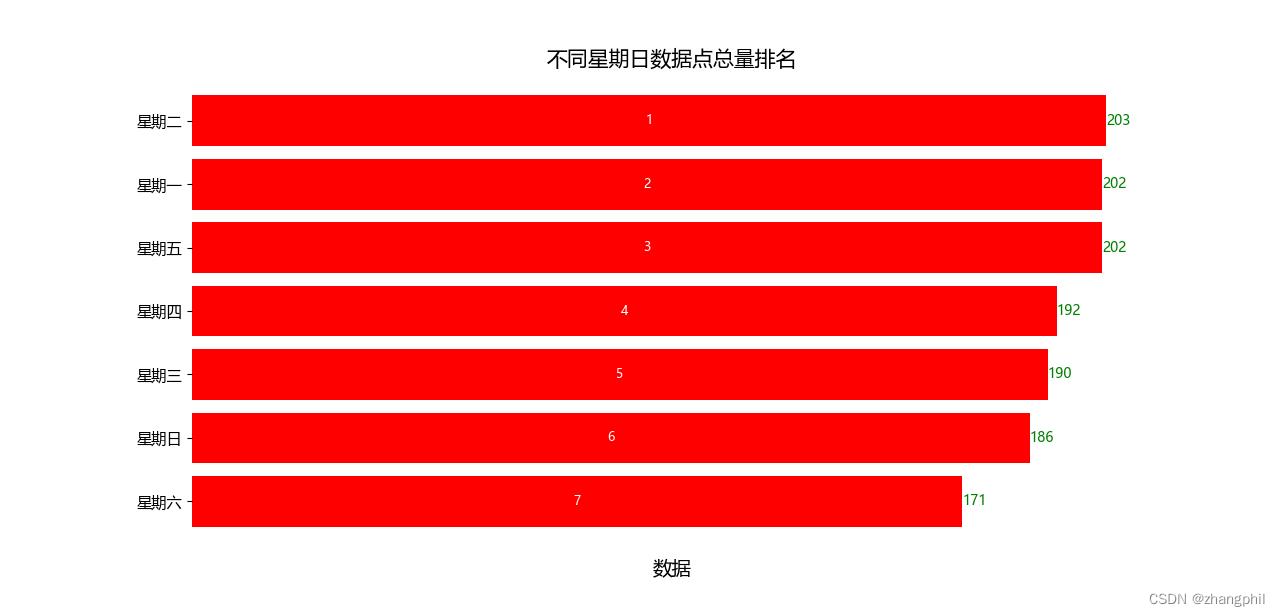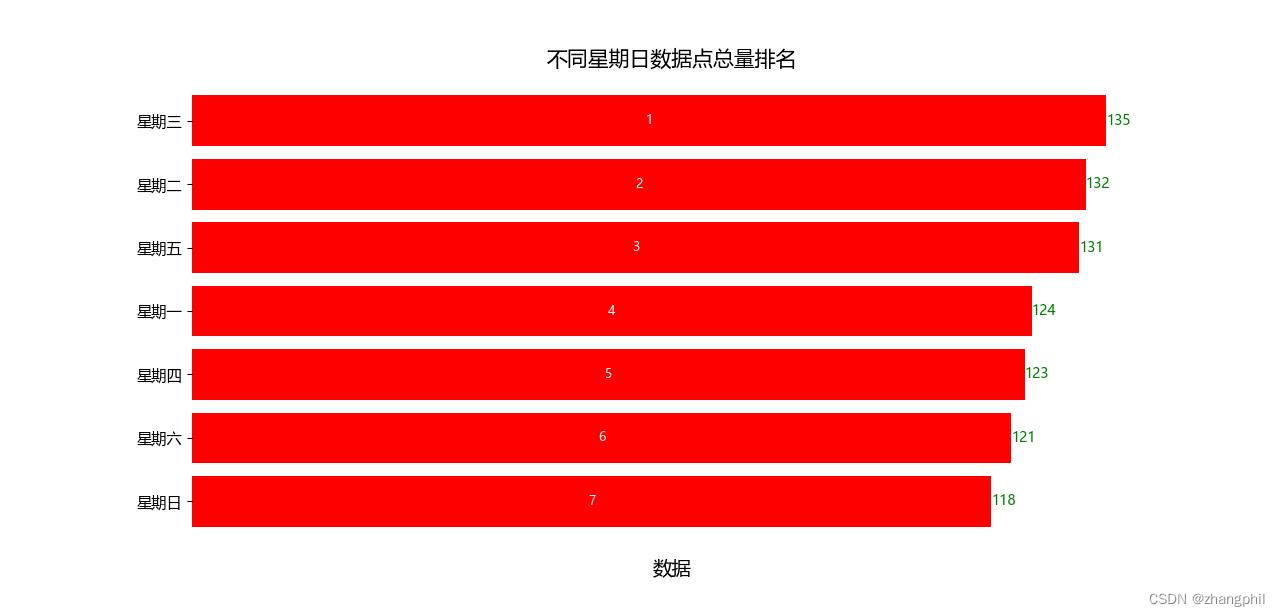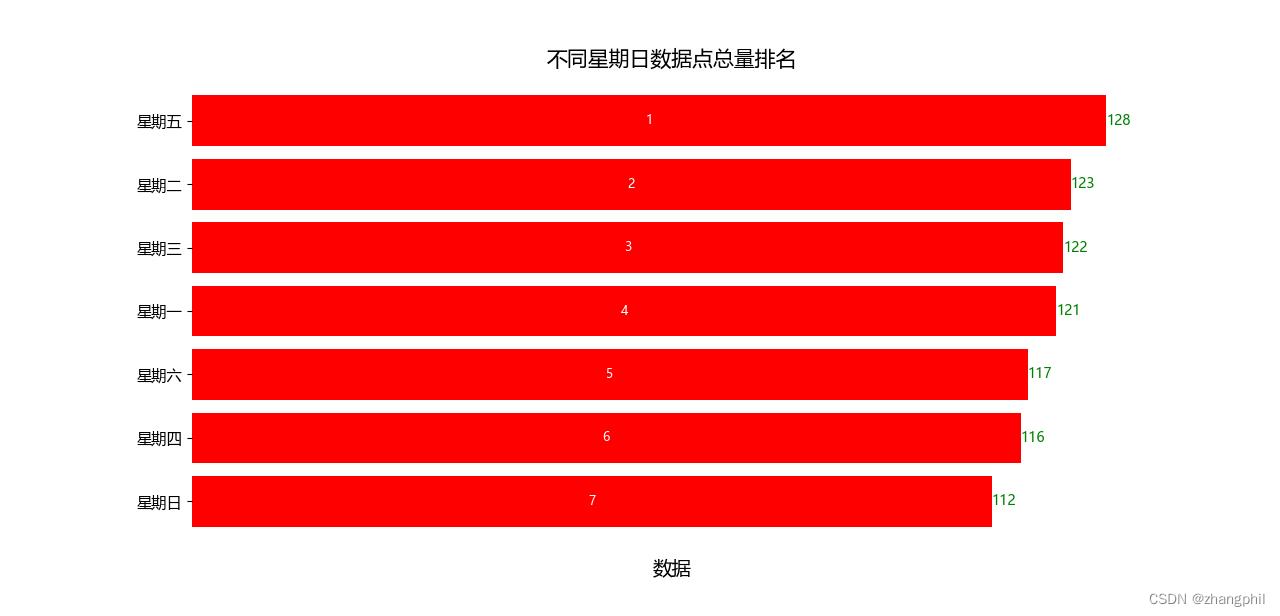[星期维度]日志数据提取事件关键词,解析对应日期的星期计数,matplotlib绘制统计图,python
Posted zhangphil
tags:
篇首语:本文由小常识网(cha138.com)小编为大家整理,主要介绍了[星期维度]日志数据提取事件关键词,解析对应日期的星期计数,matplotlib绘制统计图,python相关的知识,希望对你有一定的参考价值。
[星期维度]日志数据提取事件关键词,解析对应日期的星期计数,matplotlib绘制统计图,python
这次把日志数据中每一行包含关键词的日期对应的星期计数,绘制统计图表
参考文:
根据星期时间统计日期总量,绘制图表,pandas,matplotlib,Python
日志数据提取事件关键词,解析对应时间点计数,matplotlib绘制统计图,python
https://zhangphil.blog.csdn.net/article/details/125923359 https://zhangphil.blog.csdn.net/article/details/125923359
https://zhangphil.blog.csdn.net/article/details/125923359
from datetime import datetime
from pprint import pp
import pandas as pd
import matplotlib
import matplotlib.pyplot as plt
from fuzzywuzzy import fuzz
import re
FILE_PATH = r'源数据路径'
KEY = r'模糊匹配的关键词' # 关键词1,关键词2
threshold = 80
SECTION = 'section'
SUM = 'sum'
def drawchart(df):
myfont = matplotlib.font_manager.FontProperties(fname='C:\\Windows\\Fonts\\msyh.ttc')
plt.rcParams['axes.unicode_minus'] = False # 用来正常显示负号
plt.rc('font', family='YaHei', weight='bold')
order = []
name = []
mem = []
for d, i in zip(df.values, df.index):
order.append(i)
name.append(d[0])
mem.append(int(d[1]))
FONT_SIZE = 12
fig, ax = plt.subplots(figsize=(15, 13))
b = ax.barh(y=range(len(name)), width=mem, align='center', color='red')
# 为横向水平的柱图右侧添加数据标签。
i = 0
for rect in b:
w = rect.get_width()
ax.text(x=w, y=rect.get_y() + rect.get_height() / 2, s='%d' % (int(w)),
horizontalalignment='left', verticalalignment='center',
fontproperties=myfont, fontsize=FONT_SIZE - 2, color='green')
ax.text(x=w / 2, y=rect.get_y() + rect.get_height() / 2, s=str(order[i]),
horizontalalignment='center', verticalalignment='center',
fontproperties=myfont, fontsize=FONT_SIZE - 3, color='white')
i = i + 1
ax.set_yticks(range(len(name)))
ax.set_yticklabels(name, fontsize=FONT_SIZE - 1, fontproperties=myfont)
ax.invert_yaxis()
ax.set_xlabel('数据', fontsize=FONT_SIZE + 2, fontproperties=myfont)
ax.set_title('不同星期日数据点总量排名', fontsize=FONT_SIZE + 3, fontproperties=myfont)
# 不要横坐标上的label标签。
plt.xticks(())
# 清除四周的边框线
ax.get_yaxis().set_visible(True)
for spine in ["left", "top", "right", "bottom"]:
ax.spines[spine].set_visible(False)
plt.subplots_adjust(left=0.15) # 调整左侧边距
# ax.margins(y=0.01) #缩放 zoom in
ax.set_aspect('auto')
plt.show()
def read_file():
file = open(FILE_PATH, 'r', encoding='UTF-8')
all_case_time = []
case_count = 1
cnt = 1
for line in file:
pr = fuzz.partial_ratio(line, KEY)
if pr >= threshold:
print('-----')
print(f'第case_count件')
case_count = case_count + 1
try:
# 正则匹配 xxxx年xx月xx日xx时xx分
mat = re.search(r'\\d4\\年\\d1,2\\月\\d1,2\\日\\d1,2\\时\\d1,2\\分', line)
t_str = mat.group().replace('\\n', '') # 去掉正则匹配到但是多余的 \\n 换行符
try:
object_t = datetime.strptime(t_str, "%Y年%m月%d日%H时%M分")
all_case_time.append(object_t.date()) # 日期提取出来,放到数组中
print(f'object_t.date().strftime("%Y-%m-%d") object_t.weekday()')
except:
print('解析日期失败')
pass
except:
t_str = '-解析异常-'
pass
s = '第number行,相似度ratio,时间case_time\\ncontent'
ss = s.format(number=cnt, ratio=pr, case_time=t_str, content=line)
pp(ss)
# 快速调试
# if case_count > 100:
# break
cnt = cnt + 1
file.close()
return all_case_time
def data_frame():
ts = read_file()
times = []
for i in range(7):
times.append(SECTION: i, SUM: 0)
for t in ts:
for tx in times:
if tx[SECTION] == t.weekday():
tx[SUM] = tx[SUM] + 1
break
return times
def number_to_weekday(number):
zh = ['一', '二', '三', '四', '五', '六', '日']
weekday = f'星期zh[number]'
return weekday
if __name__ == '__main__':
times = data_frame()
# 数据组装成pandas数据帧。
pd_data = []
for t in times:
l = [number_to_weekday(t[SECTION]), t[SUM]]
pd_data.append(l)
col = ['星期', '次数']
df = pd.DataFrame(data=pd_data, columns=col)
df = df.sort_values(by=col[1], axis=0, ascending=False) # 降序
# 重置索引
df = df.reset_index(drop=True)
df.index = df.index + 1
# 前10名
pp(df.head(20))
# pp(df.values)
drawchart(df)
变换不同关键词,得出的统计图:



以上是关于[星期维度]日志数据提取事件关键词,解析对应日期的星期计数,matplotlib绘制统计图,python的主要内容,如果未能解决你的问题,请参考以下文章
[月份维度]日志数据提取包含关键词的事件,解析落入的月份计数,matplotlib绘制统计图,python
[月份维度]日志数据提取包含关键词的事件,解析落入的月份计数,matplotlib绘制统计图,python
[时间维度]日志数据提取事件关键词,解析对应时间点计数,matplotlib绘制统计图,python
[时间维度]日志数据提取事件关键词,解析对应时间点计数,matplotlib绘制统计图,python